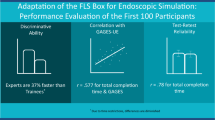Abstract
Background
Endoscopic retrograde cholangiography (ERCP) is a challenging procedure with considerable risk. Computerized simulators are valuable in training for flexible endoscopy, but little data exist for their use in ERCP training.
Aim
To determine a simulator’s ability to assess the level of ERCP skill and its responsiveness over time to increasing trainee experience.
Materials and Methods
In this prospective parallel-arm cohort study, six novice gastroenterology fellows and four gastroenterology faculty with expertise in ERCP completed four simulated baseline cases and the same four cases at a later date. This study took place at a surgical skills center at an academic tertiary referral center. The primary outcome was the total time to complete the ERCP procedure.
Results
For the baseline session, experts had a shorter total procedure time than novices (444.0 vs. 616.9 s; least squares mean; p = 0.026). There was no significant difference between experts and novices in the difference of total procedure time between session 1 and session 2 (−200.3 vs. −164.4; least squares mean; p = 0.402).
Conclusions
The simulator was able to differentiate experts from novices for the primary outcome of total procedure time. The simulator was not responsive to an increase in trainee experience over time.

Similar content being viewed by others
Abbreviations
- ERCP:
-
Endoscopic retrograde cholangiopancreatography
- GI:
-
Gastrointestinal
- SD:
-
Standard deviation
- SE:
-
Standard error
References
Andriulli A, Loperfido S, Napolitano G, et al. Incidence rates of post-ERCP complications: a systematic survey of prospective studies. Am J Gastroenterol. 2007;102:1781–1788.
Baillie J, Jowell P. ERCP training in the 1990s. Time for new ideas. Gastrointest Endosc Clin N Am. 1990;1994:409–421.
Eisen GM, Baron TH, Dominitz JA, et al. Methods of granting hospital privileges to perform gastrointestinal endoscopy. Gastrointest Endosc. 2002;55:780–783.
Training the gastroenterologist of the future: the gastroenterology core curriculum. The Gastroenterology Leadership Council. Gastroenterology. 1996;110:1266–1300.
Verma D, Gostout CJ, Petersen BT, et al. Establishing a true assessment of endoscopic competence in ERCP during training and beyond: a single-operator learning curve for deep biliary cannulation in patients with native papillary anatomy. Gastrointest Endosc. 2007;65:394–400.
Kowalski T, Kanchana T, Pungpapong S. Perceptions of gastroenterology fellows regarding ERCP competency and training. Gastrointest Endosc. 2003;58:345–349.
Gerson LB, Van Dam J. Technology review: the use of simulators for training in GI endoscopy. Gastrointest Endosc. 2004;60:992–1001.
Ferlitsch A, Glauninger P, Gupper A, et al. Evaluation of a virtual endoscopy simulator for training in gastrointestinal endoscopy. Endoscopy. 2002;34:698–702.
McConnell RA, Kim S, Ahmad NA, et al. Poor discriminatory function for endoscopic skills on a computer-based simulator. Gastrointest Endosc. 2012;76:993–1002.
Bittner JGT, Mellinger JD, Imam T, et al. Face and construct validity of a computer-based virtual reality simulator for ERCP. Gastrointest Endosc. 2010;71:357–364.
Kim S, Spencer G, Makar GA, et al. Lack of a discriminatory function for endoscopy skills on a computer-based simulator. Surg Endosc. 2010;24:3008–3015.
Author contributions
Sahakian involved in study design, data collection, and data analysis and drafted the manuscript. Laine and Aslanian involved in study design and data analysis and revised the manuscript. Jamidar, Siddiqui, and Nagar involved in study design and revised the manuscript. Duffy revised the manuscript. Ciarleglio and Deng involved in data analysis and revised the manuscript.
Author information
Authors and Affiliations
Corresponding author
Ethics declarations
Conflict of interest
None.
Rights and permissions
About this article
Cite this article
Sahakian, A.B., Laine, L., Jamidar, P.A. et al. Can a Computerized Simulator Assess Skill Level and Improvement in Performance of ERCP?. Dig Dis Sci 61, 722–730 (2016). https://doi.org/10.1007/s10620-015-3939-7
Received:
Accepted:
Published:
Issue Date:
DOI: https://doi.org/10.1007/s10620-015-3939-7






